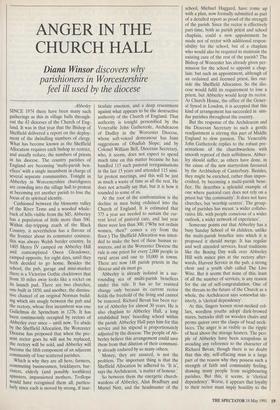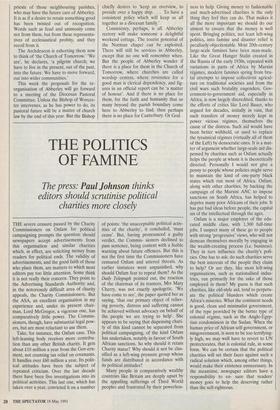ANGER IN THE CHURCH HALL
Diana Winsor discovers why
parishioners in Worcestershire feel ill used by the diocese
Abberley SINCE 1974 there have been many such gatherings as this in village halls through- out the 43 dioceses of the Church of Eng- land. It was in that year that the Bishop of Sheffield delivered a report on the deploy- ment of the dwindling numbers of clergy. What has become known as the Sheffield Allocation requires each bishop to restrict, and usually reduce, the numbers of priests in his diocese. The country parishes of England are becoming 'multi-parish ben- efices' with a single incumbent in charge of several separate communities. Tonight in Abberley in Worcestershire churchgoers are crowding into the village hall to protest at becoming yet another parish to lose the focus of its spiritual identity.
Cushioned between the blossomy valley of the River Teme and a wooded whale- back of hills visible from the M5, Abberley has a population of little more than 500. Within day-tripping reach of the Black Country, it nevertheless has a flavour of the frontier about its commuter cosiness: this was always Welsh border country. In 1405 Henry IV camped on Abberley Hill and contemplated Owen Glendower, camped opposite, for eight days, until they both decided to go home. Besides the school, the pub, garage and mini-market there is a Victorian Gothic clocktower that from 10 miles away looks like a rocket on' its launch pad. There are two churches, one built in 1850, and another, the diminu- tive chancel of an original Norman build- ing which sits snugly between the pub and the rectory, whose first incumbent was one Gulielmus de Sprincham in 1276. It has been continuously occupied by rectors of Abberley ever since — until now. To abide by the Sheffield Allocation, the Worcester Diocese has proposed that when the pre- sent rector goes he will not be replaced, the rectory will be sold, and Abberley will become the fifth component of an adjacent Community of four scattered parishes.
Which is why they are all here, farmers, commuting businessmen, bricklayers, bar- risters, elderly (and possibly toothless) spinsters, impassioned mothers. Trollope would have recognised them all, particu- larly since each is moved by strong, if inar- ticulate emotion, and a deep resentment against what appears to be the destructive authority of the Church of England. That authority is tonight personified by the Venerable John Gathercole, Archdeacon of Dudley in the Worcester Diocese, whose soft-voiced demeanour has faint suggestions of Obadiah Slope; and by Colonel William Bell, Diocesan Secretary, who, it seems, does not expect to spend much time on this matter because he has handled 115 such pastoral reorganisations in the last 15 years and attended 115 simi- lar protest meetings, and this will be just as much a waste of time as all the rest. He does not actually say that, but it is how it sounded to some of us.
At the root of the confrontation is the decline in men being ordained into the Church of England. It is estimated that 375 a year are needed to sustain the cur- rent level of pastoral care, and last year there were less than 300. ('Why not ordain women, then?' comes a cry from the floor.) The Sheffield Allocation was inten- ded to make the best of these human re- sources, and in the Worcester Diocese the rule is one priest for every 2,000 people in rural areas and one to 10,000 in towns. There are now 148 parish priests in the diocese and six must go.
Abberley is already isolated in a sur- rounding sea of multi-parish benefices under this rule. It has so far resisted change only because its current rector holds the freehold of the living and cannot be removed. Richard Bevan has been rec- tor of Abberley for almost 30 years. He is also chaplain to Abberley Hall, a long established boys' boarding school within the parish. Abberley Hall pays him for this service and his stipend is proportionately adjusted by the diocese. The people of Ab- berley believe this arrangement could save them from that dilution of their communi- ty already endured by so many others. Money, they are assured, is not the problem. The important thing is that the Sheffield Allocation be adhered to. 'It is', says the Archdeacon, 'a matter of honour.' So between them the energetic church- wardens of Abberley, Alan Bradbury and Muriel Nott, and the headmaster of the school, Michael Haggard, have come up with a plan, now formally submitted as part of a detailed report as proof of the strength of the parish. Since the rector is effectively part-time, both as parish priest and school chaplain, could a new appointment be made not of rector with additional respon- sibility for the school, but of a chaplain who would also be required to maintain the existing care of the rest of the parish? The Bishop of Worcester has already given per- mission for the school to appoint a chap- lain: but such an appointment, although of an ordained and licensed priest, lies out- side the Sheffield Allocation. So the dio- cese would fulfil its requirement to lose a priest, but Abberley would keep its rector. At Church House, the office of the Gener- al Synod in London, it is accepted. that this kind of arrangement has succeeded in sim- ilar parishes throughout the country.
But the response of the Archdeacon and the Diocesan Secretary to such a gentle readjustment is stirring this part of Middle England to slow passion. The Venerable John Gathercole replies to the robust pre- sentations of the churchwardens with smooth reproof of their selfishness. Abber- ley should suffer, as others have done, in the cause of the new martyrdom favoured by the Archbishop of Canterbury. Besides, they might be enriched, rather than impov- erished, by becoming a multi-parish bene- fice. He describes a splendid example of one where pastoral care does not rely on a priest but 'the community'. It does not have churches, but 'worship centres'. The group- ing of parishes has meant 'a wider collabo- rative life, with people conscious of a wider outlook, a wider network of experience'.
Someone points out that Abberley has a busy Sunday School of 44 children, unlike the multi-parish benefice into which it is proposed it should merge. It has regular and well attended services, focal traditions like the Boxing Day walk over Abberley Hill with mince pies at the rectory after- wards, Harvest Service in the pub, a strong choir and a youth club called The Live Wire. But it seems that none of this, least of all the number of services, is any reason for the sin of self-congratulation. One of the threats to the future of the Church as a whole, the Archdeacon says somewhat sin- isterly, is 'clerical dependency'.
At this, fingers loosen stout-necked col- lars, wordless youths adopt dark-browed stares, buttocks shift on wooden chairs and perms quiver over the clasps of bead neck- laces. The anger is as visible as the ripple of heat above the storage heaters. The peo- ple of Abberley have been scrupulous in avoiding any reference to the character of Richard Bevan, though there is no doubt that this shy, self-effacing man is a large part of the reason why they possess such a strength of faith and community feeling, drawing many people from neighbouring parishes. But this, it seems, is 'clerical dependency'. Worse, it appears that loyalty to their rector must imply hostility to the priests of those neighbouring parishes, who may have the future care of Abberley. It is as if a desire to retain something good has been twisted out of recognition. Words such as feud and animosity come not from them, but from these representa- tives of ecclesiastical probity, and they recoil from it.
The Archdeacon is exhorting them now to think of `the Church of Tomorrow.' We are', he declares, 'a pilgrim church; we have to live in the present, out of the past, into the future. We have to move forward, out into wider communities.'
This week the proposals for the re- organisation of Abberley will go forward to a meeting of the Diocesan Pastoral Committee. Unless the Bishop of Worces- ter intervenes, as he has power to do, its pastoral future will be a matter of church law by the end of this year. But the Bishop chiefly desires to 'keep an overview, to preside over a happy ship. . . . To have a consistent policy which will keep us all together as a diocesan family.'
Consistency, perhaps, is all. Abberley rectory will make someone a delightful weekend cottage. The tourist potential of the Norman chapel can be exploited. There will still be services in Abberley, except that no one will remember when. But the people of Abberley wonder if there is a place for them in the Church of Tomorrow, where churches are called worship centres, where reverence for a good man is clerical dependency, and fig- ures in an official report can be `a matter of honour'. And if there is no place for them, for the faith and humanity that so many beyond the parish boundary come here to Abberley to find, then perhaps there is no place for Canterbury. Or God.



























































 Previous page
Previous page